Oldest millennial is now 39 years old & did u know that our group owns only 3% of the totally wealth vs the boomers during the same age owned 21% of total.
This crisis has not destroyed to create just like 2008. When will the millennials gain wealth? 39 is close to middle age.
This crisis has not destroyed to create just like 2008. When will the millennials gain wealth? 39 is close to middle age.
Guys, we are not young anymore! Our 40s, 50s, 60s, 70s are around the corner & we own too little for having been around so long.
How do we fix this???
I worry for the people of my generation & how unprepared we are for our old age/future.
How do we fix this???
I worry for the people of my generation & how unprepared we are for our old age/future.
Good morning  https://abs.twimg.com/emoji/v2/... draggable="false" alt="👋🏻" title="Waving hand (heller Hautton)" aria-label="Emoji: Waving hand (heller Hautton)">
https://abs.twimg.com/emoji/v2/... draggable="false" alt="👋🏻" title="Waving hand (heller Hautton)" aria-label="Emoji: Waving hand (heller Hautton)">
Didn& #39;t think random musing would be viral & will dedicate my spare time to analyze this topic as we are the future & our future is not looking great. Idea isn& #39;t to blame boomers (us vs them) but to learn why this has happened & what we can do to change this.
 https://abs.twimg.com/emoji/v2/... draggable="false" alt="🤗" title="Umarmendes Gesicht" aria-label="Emoji: Umarmendes Gesicht">
https://abs.twimg.com/emoji/v2/... draggable="false" alt="🤗" title="Umarmendes Gesicht" aria-label="Emoji: Umarmendes Gesicht">
Didn& #39;t think random musing would be viral & will dedicate my spare time to analyze this topic as we are the future & our future is not looking great. Idea isn& #39;t to blame boomers (us vs them) but to learn why this has happened & what we can do to change this.
Are you ready? Here are the charts to visualize wealth distribution. The oldest millennial is 39 & if we compare generation for the same age period:
*In 1989, boomer had 21.5% of total wealth (we& #39;ll talk about distribution soon)
*In 2019, millennial of the same age has 2.7%
 https://abs.twimg.com/emoji/v2/... draggable="false" alt="👇🏻" title="Rückhand Zeigefinger nach unten (heller Hautton)" aria-label="Emoji: Rückhand Zeigefinger nach unten (heller Hautton)">
https://abs.twimg.com/emoji/v2/... draggable="false" alt="👇🏻" title="Rückhand Zeigefinger nach unten (heller Hautton)" aria-label="Emoji: Rückhand Zeigefinger nach unten (heller Hautton)">
*In 1989, boomer had 21.5% of total wealth (we& #39;ll talk about distribution soon)
*In 2019, millennial of the same age has 2.7%
Ready? Here are the details of net worth & assets. Comparing Baby Boomer (BB) in 1989 versus Millennial (B) in 2019,
Baby Boomber in blue bars & Millennial in red bars. What do you see????
Details of assets also included below.
Baby Boomber in blue bars & Millennial in red bars. What do you see????
Details of assets also included below.
Let me show it differently by taking the difference between Baby Boomer versus the Millennial at the same age. The wealth gap by order of HIGHEST:
Real estate 28%
Durables 26
Private biz 26
Corporate equities & mutual fund shares 18
Pension entitlements 17
Assets 22
Networth 19
Real estate 28%
Durables 26
Private biz 26
Corporate equities & mutual fund shares 18
Pension entitlements 17
Assets 22
Networth 19
Basic human needs: SHELTER. Let& #39;s look at real asset share of ownership of Baby Boomer generation in 1989 vs Millennial in 2019 (same age):
Baby Boomer owned 32% of real estate https://abs.twimg.com/emoji/v2/... draggable="false" alt="🏠" title="Haus" aria-label="Emoji: Haus"> assets in 1989
https://abs.twimg.com/emoji/v2/... draggable="false" alt="🏠" title="Haus" aria-label="Emoji: Haus"> assets in 1989
Millennial owned only 4% of real estate https://abs.twimg.com/emoji/v2/... draggable="false" alt="🏠" title="Haus" aria-label="Emoji: Haus">assets in 2019
https://abs.twimg.com/emoji/v2/... draggable="false" alt="🏠" title="Haus" aria-label="Emoji: Haus">assets in 2019
The https://abs.twimg.com/emoji/v2/... draggable="false" alt="🏠" title="Haus" aria-label="Emoji: Haus">gap is 28%
https://abs.twimg.com/emoji/v2/... draggable="false" alt="🏠" title="Haus" aria-label="Emoji: Haus">gap is 28%  https://abs.twimg.com/emoji/v2/... draggable="false" alt="👇🏻" title="Rückhand Zeigefinger nach unten (heller Hautton)" aria-label="Emoji: Rückhand Zeigefinger nach unten (heller Hautton)">
https://abs.twimg.com/emoji/v2/... draggable="false" alt="👇🏻" title="Rückhand Zeigefinger nach unten (heller Hautton)" aria-label="Emoji: Rückhand Zeigefinger nach unten (heller Hautton)"> https://abs.twimg.com/emoji/v2/... draggable="false" alt="👇🏻" title="Rückhand Zeigefinger nach unten (heller Hautton)" aria-label="Emoji: Rückhand Zeigefinger nach unten (heller Hautton)">
https://abs.twimg.com/emoji/v2/... draggable="false" alt="👇🏻" title="Rückhand Zeigefinger nach unten (heller Hautton)" aria-label="Emoji: Rückhand Zeigefinger nach unten (heller Hautton)"> https://abs.twimg.com/emoji/v2/... draggable="false" alt="👇🏻" title="Rückhand Zeigefinger nach unten (heller Hautton)" aria-label="Emoji: Rückhand Zeigefinger nach unten (heller Hautton)">
https://abs.twimg.com/emoji/v2/... draggable="false" alt="👇🏻" title="Rückhand Zeigefinger nach unten (heller Hautton)" aria-label="Emoji: Rückhand Zeigefinger nach unten (heller Hautton)">
Baby Boomer owned 32% of real estate
Millennial owned only 4% of real estate
The
Millennials, who are now approaching middle age, own only 4% of total housing assets in the USA, they are also not owning the following wealth: consumer durables.
When u think about what buying a house entails, can see a generation missing out.
House = leverage to build wealth.
When u think about what buying a house entails, can see a generation missing out.
House = leverage to build wealth.
When u put a down payment, whether 10 or 20% is a form of leverage with the bank who lends u the fund to pay off a house & if interest rates are LOW then u can accumulate wealth faster.
When u buy a house, u invest & commit & spend $ on things other than the self but community.
When u buy a house, u invest & commit & spend $ on things other than the self but community.
Property tax is a contribution to local community. Spending on gardening & landscaping not only enhances the soul (and even a food source) but also beautify the neigborhood. And then there are things to improve inside the house etc. Start thinking long-term vs short-term spending
We have a generation of Americans not part of this. Housing wealth is the best way to provide security when old (no more housing costs if paid off & what& #39;s left is property tax + insurance & maintenance) & also a source of security for the next generation.
This chart is scary https://abs.twimg.com/emoji/v2/... draggable="false" alt="👇🏻" title="Rückhand Zeigefinger nach unten (heller Hautton)" aria-label="Emoji: Rückhand Zeigefinger nach unten (heller Hautton)">
https://abs.twimg.com/emoji/v2/... draggable="false" alt="👇🏻" title="Rückhand Zeigefinger nach unten (heller Hautton)" aria-label="Emoji: Rückhand Zeigefinger nach unten (heller Hautton)">
This chart is scary
Why do I find it scary? Of the following consequence:
Boomer owns 57% of wealth in the USA & millennial only 4% & so when they die & they pass down the wealth, the divide WILL WIDEN b/n inherited wealth & NOT so less about merit & genetics.
Real estate is 50% vs 4% so same!
Boomer owns 57% of wealth in the USA & millennial only 4% & so when they die & they pass down the wealth, the divide WILL WIDEN b/n inherited wealth & NOT so less about merit & genetics.
Real estate is 50% vs 4% so same!
I gotta go to lunch but here are questions for you to ponder on the wealth gap:
a) What policy has led to this widening divide?
b) What can we do to rectify this worrying trend of deepening the divide & turn the US into more of a meritocracy so more people can be upwardly mobile?
a) What policy has led to this widening divide?
b) What can we do to rectify this worrying trend of deepening the divide & turn the US into more of a meritocracy so more people can be upwardly mobile?
Let& #39;s define a few things:
Boomers = Born 1946 to 1964
Generation X = 1965 to 1980
Millennial or Gen Y = 1981 to 1996
Let& #39;s look at the share of total net worth of the different generations at age 39:
Boomers = 21%
Gen X =7%
Millennial =3%
Boomers = Born 1946 to 1964
Generation X = 1965 to 1980
Millennial or Gen Y = 1981 to 1996
Let& #39;s look at the share of total net worth of the different generations at age 39:
Boomers = 21%
Gen X =7%
Millennial =3%
In 2020, age of the oldest of their respective generation:
Boomers = 74
Generation X = 55
Millennial = 39
And so they own by 2020 share of total wealth:
Boomers = 57%
Generation X = 17%
Millennial = 3%
Boomers = 74
Generation X = 55
Millennial = 39
And so they own by 2020 share of total wealth:
Boomers = 57%
Generation X = 17%
Millennial = 3%
Okay you may like this - change of share of total wealth from:
2007 to 2008
and
2008 to 2019
Generation X lost a lot of wealth from 2008 to 2007. However, it gained the most from 2008 to 2019.
Millennial lagged both Boomers & Generation X people.
2007 to 2008
and
2008 to 2019
Generation X lost a lot of wealth from 2008 to 2007. However, it gained the most from 2008 to 2019.
Millennial lagged both Boomers & Generation X people.
In 2008, age of the oldest of the groups were:
Boomers: 62
Generation X: 43
Millennial: 27
Millennials didn& #39;t have much wealth to lose in 2007 (only 0.5% of total wealth) & from 2008 onward, lagged behind due to the job market & continued to fall behind in ownership of assets.
Boomers: 62
Generation X: 43
Millennial: 27
Millennials didn& #39;t have much wealth to lose in 2007 (only 0.5% of total wealth) & from 2008 onward, lagged behind due to the job market & continued to fall behind in ownership of assets.
Change of share of total net worth from 2007 to 2019 by groups:
Boomers +8.6% of the wealth pie
Generation X +7.4% of total wealth pie
Millennial +2.2% to total wealth to reach to total wealth by 2019 of 2.7% of the total net worth pie.
We are in the slow train to adulthood. https://abs.twimg.com/emoji/v2/... draggable="false" alt="👇🏻" title="Rückhand Zeigefinger nach unten (heller Hautton)" aria-label="Emoji: Rückhand Zeigefinger nach unten (heller Hautton)">
https://abs.twimg.com/emoji/v2/... draggable="false" alt="👇🏻" title="Rückhand Zeigefinger nach unten (heller Hautton)" aria-label="Emoji: Rückhand Zeigefinger nach unten (heller Hautton)">
Boomers +8.6% of the wealth pie
Generation X +7.4% of total wealth pie
Millennial +2.2% to total wealth to reach to total wealth by 2019 of 2.7% of the total net worth pie.
We are in the slow train to adulthood.
Current distribution of net worth by age groups:
Silent 24%
Boomers 57%
Generation X 17%
Millennial 2.7%
Silent = Born between 1928 and 1945.
Silent 24%
Boomers 57%
Generation X 17%
Millennial 2.7%
Silent = Born between 1928 and 1945.
Urghhh, this is bad news. Let& #39;s look at our choice of private debt:
a) We have 33.1% of total consumer credit, and that is higher from 1.2% in 2008 https://abs.twimg.com/emoji/v2/... draggable="false" alt="🤢" title="Angewidertes Gesicht" aria-label="Emoji: Angewidertes Gesicht">
https://abs.twimg.com/emoji/v2/... draggable="false" alt="🤢" title="Angewidertes Gesicht" aria-label="Emoji: Angewidertes Gesicht"> https://abs.twimg.com/emoji/v2/... draggable="false" alt="🤢" title="Angewidertes Gesicht" aria-label="Emoji: Angewidertes Gesicht">
https://abs.twimg.com/emoji/v2/... draggable="false" alt="🤢" title="Angewidertes Gesicht" aria-label="Emoji: Angewidertes Gesicht"> https://abs.twimg.com/emoji/v2/... draggable="false" alt="🤢" title="Angewidertes Gesicht" aria-label="Emoji: Angewidertes Gesicht">
https://abs.twimg.com/emoji/v2/... draggable="false" alt="🤢" title="Angewidertes Gesicht" aria-label="Emoji: Angewidertes Gesicht">
and the bad news is
b) We have even less home mortgages. Now only 9.9% of total & that& #39;s a decline from 12.1% in 2015.
 https://abs.twimg.com/emoji/v2/... draggable="false" alt="😬" title="Grimasse schneidendes Gesicht" aria-label="Emoji: Grimasse schneidendes Gesicht">
https://abs.twimg.com/emoji/v2/... draggable="false" alt="😬" title="Grimasse schneidendes Gesicht" aria-label="Emoji: Grimasse schneidendes Gesicht">
a) We have 33.1% of total consumer credit, and that is higher from 1.2% in 2008
and the bad news is
b) We have even less home mortgages. Now only 9.9% of total & that& #39;s a decline from 12.1% in 2015.
Liabilities of different generation: mortgages & consumer credit.
Baby Boom in 1989 at 59% of total home mortgages
Gen X in 2001 at 19% of total home mortgages
Millennial in 2019 10% of total home mortgages.
The gap between mortgages and consumer credit is scary for millennial
Baby Boom in 1989 at 59% of total home mortgages
Gen X in 2001 at 19% of total home mortgages
Millennial in 2019 10% of total home mortgages.
The gap between mortgages and consumer credit is scary for millennial
Let& #39;s talk about how we are so different at the same age as our elders (Boomers & Generation X):
Here I show the gap between share of total home mortgages and consumer credit.
Millennial leverage more consume vs investing in homes. The question is why we made these choices.
Here I show the gap between share of total home mortgages and consumer credit.
Millennial leverage more consume vs investing in homes. The question is why we made these choices.
And finally, the charts to compare wealth between oldest Boomer, Gen X & Millennial at the same age. These 3 groups are the same age for the following years:
Boomer = 1989 (actually in 1986 but we don& #39;t have that data so use 1989)
Gen X = 2001
Millennial = 2019
Boomer = 1989 (actually in 1986 but we don& #39;t have that data so use 1989)
Gen X = 2001
Millennial = 2019
This is sad: millennial do not own FINANCIAL ASSETS. Our share of total is only 1% right now.
At our age, boomers at 19%.
How do we gain from low interest rates & free money from the Federal Reserve if we do not own much hard asset (housing) & very little financial asset.
At our age, boomers at 19%.
How do we gain from low interest rates & free money from the Federal Reserve if we do not own much hard asset (housing) & very little financial asset.
Some positive news: millennials are better than Generation X in terms of saving for retirement but behind the baby boomers by a long shot.
Millennials also don& #39;t own private businesses as our share of private business is only 2% vs Gen X at our age at 7% and Baby Boomer of 27%.
Here is a summary of what we OWN & sadly we don& #39;t own much hard assets & financial assets.
The question that& #39;ll be addressed at the next session will be:
*How did we get here?
*What can we do about it!
See you next time! https://abs.twimg.com/emoji/v2/... draggable="false" alt="👋🏻" title="Waving hand (heller Hautton)" aria-label="Emoji: Waving hand (heller Hautton)">
https://abs.twimg.com/emoji/v2/... draggable="false" alt="👋🏻" title="Waving hand (heller Hautton)" aria-label="Emoji: Waving hand (heller Hautton)">
Sincerely,
@Trinhnomics (A millennial from CA in HK https://abs.twimg.com/emoji/v2/... draggable="false" alt="🤗" title="Umarmendes Gesicht" aria-label="Emoji: Umarmendes Gesicht">)
https://abs.twimg.com/emoji/v2/... draggable="false" alt="🤗" title="Umarmendes Gesicht" aria-label="Emoji: Umarmendes Gesicht">)
The question that& #39;ll be addressed at the next session will be:
*How did we get here?
*What can we do about it!
See you next time!
Sincerely,
@Trinhnomics (A millennial from CA in HK
It& #39;s lunch time again & will dedicate lunch to u to talk more about this as 1.1M saw this on Twitter & 0.14M engaged w/ it.
We all agree that we& #39;re concerned about our present & future. As we own:
1% financial assets
2% private biz
4% real estate
yet 33% of consumer debt https://abs.twimg.com/emoji/v2/... draggable="false" alt="👈🏻" title="Rückhand Zeigefinger nach links (heller Hautton)" aria-label="Emoji: Rückhand Zeigefinger nach links (heller Hautton)">
https://abs.twimg.com/emoji/v2/... draggable="false" alt="👈🏻" title="Rückhand Zeigefinger nach links (heller Hautton)" aria-label="Emoji: Rückhand Zeigefinger nach links (heller Hautton)"> https://abs.twimg.com/emoji/v2/... draggable="false" alt="😬" title="Grimasse schneidendes Gesicht" aria-label="Emoji: Grimasse schneidendes Gesicht">!
https://abs.twimg.com/emoji/v2/... draggable="false" alt="😬" title="Grimasse schneidendes Gesicht" aria-label="Emoji: Grimasse schneidendes Gesicht">!
We all agree that we& #39;re concerned about our present & future. As we own:
1% financial assets
2% private biz
4% real estate
yet 33% of consumer debt
The answer to how we got here should start with the following reflection:
*Systemic reasons why we are behind
*Individual responsibility to how we can bring about change to reverse this trend.
The bulk of work will have to come from us through public & private engagement.
*Systemic reasons why we are behind
*Individual responsibility to how we can bring about change to reverse this trend.
The bulk of work will have to come from us through public & private engagement.
Let& #39;s talk about systemic reasons why we are behind. I speak as a millennial that graduated from grad school in 2010, which is right after the Great Financial Crisis & the greatest recession since the Great Depression. Will add both personal & macro statistics to this discussion.
Millennial or Gen Y is a group of people born between 1981 to 1996. Obviously there are older millennial (oldest 39) & young ones that are 24.
Irrespective, they are full fledged adults w/ 15 yrs b/n them. Some have been around much longer & others just starting out in career.
Irrespective, they are full fledged adults w/ 15 yrs b/n them. Some have been around much longer & others just starting out in career.
In 2009, the oldest millennial would be 28 years old. And those born in the mid 1980s would be 24 years old in 2009.
Let& #39;s talk about the 24-28 years old Americans. What do they find when they emerged from undergraduate/grad school?
The aftermath of the GFC. US unemployment https://abs.twimg.com/emoji/v2/... draggable="false" alt="👇🏻" title="Rückhand Zeigefinger nach unten (heller Hautton)" aria-label="Emoji: Rückhand Zeigefinger nach unten (heller Hautton)">.
https://abs.twimg.com/emoji/v2/... draggable="false" alt="👇🏻" title="Rückhand Zeigefinger nach unten (heller Hautton)" aria-label="Emoji: Rückhand Zeigefinger nach unten (heller Hautton)">.
Let& #39;s talk about the 24-28 years old Americans. What do they find when they emerged from undergraduate/grad school?
The aftermath of the GFC. US unemployment
They would find the most unfavorable labor market since 1980s & the unemployment rate was persistently high from 2008 to 2014 that was above 6% & more importantly peaked at 10%. Youth unemployment of course was much higher. U should this: US labor participation rate FELL sharply
How do u calculate unemployment:
Take the total unemployed divided by the labor force.
But actually, it& #39;s misleading because they take out the people that have given up looking for a job BUT OF WORKING AGE.
Participation rate is the ratio of that and that declined after GFC!
Take the total unemployed divided by the labor force.
But actually, it& #39;s misleading because they take out the people that have given up looking for a job BUT OF WORKING AGE.
Participation rate is the ratio of that and that declined after GFC!
That& #39;s what I call systemic: u as an individual entering an environment that is unfavorable to your future income outcome.
What else is there about you before u earnestly started ur career in a bad market?
You have a lot of debt. And u started out w/ a lot of non-mortgage debt.
What else is there about you before u earnestly started ur career in a bad market?
You have a lot of debt. And u started out w/ a lot of non-mortgage debt.
Let& #39;s take the year I finished grad school in 2010 (went to Johns Hopkins University & UCLA for undergrad). Oldest millennial would be 29.
Your share of non-mortgage debt was already 12.6% of total in 2010 so u have a lot of debt relative to income just starting out.
So?
Your share of non-mortgage debt was already 12.6% of total in 2010 so u have a lot of debt relative to income just starting out.
So?
Let& #39;s talk about the system. As u know, it almost collapsed due to excessive risk taking. So to mitigate the fallout of the decline of financial & housing asset price, the gov& #39; (Obama) & Fed (Bernanke) did government spending & lowered interest rates to zero & bought gov bonds.
If u are the oldest millennial, this happened while u& #39;re working. And if u are younger, u& #39;re about the enter the workforce with:
Student loan + consumer debt + high unemployment + collapsed asset prices that about to be stimulated by low interest rates, fiscal programs & QE.
Student loan + consumer debt + high unemployment + collapsed asset prices that about to be stimulated by low interest rates, fiscal programs & QE.
As someone who just graduated & got debt & unfavorable labor market & limited financial literacy, UNLIKELY that u& #39;d have the cash to:
* Purchase a home at bottom (prices did crash so good for those w/ cash to buy cheaper)
* Purchase financial assets (stocks+bonds) at the bottom
* Purchase a home at bottom (prices did crash so good for those w/ cash to buy cheaper)
* Purchase financial assets (stocks+bonds) at the bottom
Evolution of HARD asset (home price) & financial asset (SPX total return).
If price in 2009 = 100, which is the bottom of the market & a very good entry level for those willing to take the risk & have cash, key caveats that Millennials do not qualify,
then
SPX = 468
Home =144
If price in 2009 = 100, which is the bottom of the market & a very good entry level for those willing to take the risk & have cash, key caveats that Millennials do not qualify,
then
SPX = 468
Home =144
Change of wealth from 2007-2019: Share is more positive for all three generations but the gain for Millennial is much less for the fact that they did not own enough (& still don& #39;t):
Financial Asset
Real Estate Asset
Change of net worth & evolution of millennial asset share https://abs.twimg.com/emoji/v2/... draggable="false" alt="👇🏻" title="Rückhand Zeigefinger nach unten (heller Hautton)" aria-label="Emoji: Rückhand Zeigefinger nach unten (heller Hautton)">
https://abs.twimg.com/emoji/v2/... draggable="false" alt="👇🏻" title="Rückhand Zeigefinger nach unten (heller Hautton)" aria-label="Emoji: Rückhand Zeigefinger nach unten (heller Hautton)">
Financial Asset
Real Estate Asset
Change of net worth & evolution of millennial asset share
Okay, so we are here so far:
*Enter the job market when it& #39;s one of the worst in modern history
*Have non-mortgage debt (student loans)
*Don& #39;t have cash to buy assets that are about to rise SHARPLY.
Let& #39;s talk about assets & why u should care & improve ur financial literary!
*Enter the job market when it& #39;s one of the worst in modern history
*Have non-mortgage debt (student loans)
*Don& #39;t have cash to buy assets that are about to rise SHARPLY.
Let& #39;s talk about assets & why u should care & improve ur financial literary!
There are two types of assets you can own:
Physical asset (a home/car/watch)
Financial asset (stocks or bonds & they differ due to return & risks).
U can buy a home or rent. When u buy a home, u put down 10-20% & the bank lend u the rest at an interest rate (fixed or variable).
Physical asset (a home/car/watch)
Financial asset (stocks or bonds & they differ due to return & risks).
U can buy a home or rent. When u buy a home, u put down 10-20% & the bank lend u the rest at an interest rate (fixed or variable).
Before u can buy assets, u need money that u have saved up working & not SPENDING & not BORROWING to CONSUME to then invest in say a home. Key is disposable income net of essential expenses + debt payment. So let& #39;s look at disposable income per capital in the USA & home prices.
When u get out of grad/undergrad school w/ student loan debt, have to prioritize the following:
*Low fixed costs (lower quality of housing & reduce eating out/drinking/shopping/traveling)
*Pay off high interest student loans ASAP & preferably before 30.
Why? Look at the rates.
*Low fixed costs (lower quality of housing & reduce eating out/drinking/shopping/traveling)
*Pay off high interest student loans ASAP & preferably before 30.
Why? Look at the rates.
As u know, the Fed Fund Rate is close to ZERO but that& #39;s not what u pay on your consumer credit card or ur student loans.
Why? B/c they are non-collateralized & u have very high risks & risks priced into rates.
If u want to get ahead, need to reduce high costs of debt.
Why? B/c they are non-collateralized & u have very high risks & risks priced into rates.
If u want to get ahead, need to reduce high costs of debt.
The fact that millennials have DECLINING share of mortage debts (that have lower interest rates so good to have debt when ur costs of debt getting lower) while HIGHER SHARE OF CONSUMER DEBT + STUDENT LOAN DEBT is worrying.
We need to reduce the orange line & raise the blue line.
We need to reduce the orange line & raise the blue line.
Back to interest rates & why millennials have so much non-mortgage debt. BOTH SYSTEMIC & INDIVIDUAL reasons:
*System gives debts without questions asked & without educating them about the need to repay as INTEREST RATES ARE HIGH, esp graduate school debt
*Need to pay back debt!!
*System gives debts without questions asked & without educating them about the need to repay as INTEREST RATES ARE HIGH, esp graduate school debt
*Need to pay back debt!!
If someone educated u that the unsubsidized undergraduate student loans u have are VERY EXPENSIVE & that u& #39;ll need to CAREFULLY CONSIDER THE RETURN OF YOUR EDUCATION, which means JOB & INCOME PROSPECT, then u& #39;d reconsider taking all of that on.
We weren& #39;t taught this & borrowed.
We weren& #39;t taught this & borrowed.
And most importantly, YOU CANNOT DECLARE BANKRUPTCY on your student loan debt.
And u did this when u were 18 & u had no idea what u were doing & did not take college decision as seriously as u should& #39;ve & racking up debt that the older adult u have to pay.
Systemic problem.
And u did this when u were 18 & u had no idea what u were doing & did not take college decision as seriously as u should& #39;ve & racking up debt that the older adult u have to pay.
Systemic problem.
We must change this culture of young people taking out debt such as consumer credit card, auto loan debt, & STUDENT LOAN DEBT without understanding compound interests & how that will eat into their future prospect.
Okay, let& #39;s talk about assets now that we talked about debt https://abs.twimg.com/emoji/v2/... draggable="false" alt="🤗" title="Umarmendes Gesicht" aria-label="Emoji: Umarmendes Gesicht">.
https://abs.twimg.com/emoji/v2/... draggable="false" alt="🤗" title="Umarmendes Gesicht" aria-label="Emoji: Umarmendes Gesicht">.
Okay, let& #39;s talk about assets now that we talked about debt
Actually, let me illustrate what compound interests are assuming this:
USD10,000
After 10 years on the following rates:
Deposit at bank = 0.06%
Mortgage =3.52%
Undergrad loan = 4.5%
Graduate loan =7.1%
Credit debt rate = 15% (random here & can be higher)
Your grd loan doubles!
USD10,000
After 10 years on the following rates:
Deposit at bank = 0.06%
Mortgage =3.52%
Undergrad loan = 4.5%
Graduate loan =7.1%
Credit debt rate = 15% (random here & can be higher)
Your grd loan doubles!
So you can see why u want to pay down you highest interest rates as fast as possible because it will eat into your future very very fast. Best is if u borrow at a rate that is LOWER THAN YOUR EXPECTED RETURN. Ok, we talk about assets b/c u want to own assets that give u return! https://abs.twimg.com/emoji/v2/... draggable="false" alt="🤗" title="Umarmendes Gesicht" aria-label="Emoji: Umarmendes Gesicht">
https://abs.twimg.com/emoji/v2/... draggable="false" alt="🤗" title="Umarmendes Gesicht" aria-label="Emoji: Umarmendes Gesicht">
Disposable income & US home prices & CA home prices. First, I normalized everything to make it easier for u to think. We assume that the value of the year of 2009 = 100.
Note ur disposable income per capita has risen but it doesn& #39;t take into ur consumption behavior & debt.
Note ur disposable income per capita has risen but it doesn& #39;t take into ur consumption behavior & debt.
Average disposable income per capita has risen as much as US house price. But US house price has some pretty laggard places & some very expensive places. Importantly, u didn& #39;t buy at the bottom as u had limited capital & debt.
Let& #39;s use disposable per capita vs some key assets
Let& #39;s use disposable per capita vs some key assets
The US is a rather unequal place & I don& #39;t just mean inter-generational/race etc but in interstate wealth & growth & opportunities.
So if u want to have higher income & get a good job, u need to move to where the jobs are. CA is my home state & it& #39;s a great economy.
So?
So if u want to have higher income & get a good job, u need to move to where the jobs are. CA is my home state & it& #39;s a great economy.
So?
If u worked hard, and assuming u made great decisions in paying off your student loan debt ASAP & do not have any consumer credit debt & put your disposable income into savings through just bank deposits then u are not compounding at all.
CA home price & SPX return skyrockets! https://abs.twimg.com/emoji/v2/... draggable="false" alt="🚀" title="Rakete" aria-label="Emoji: Rakete">
https://abs.twimg.com/emoji/v2/... draggable="false" alt="🚀" title="Rakete" aria-label="Emoji: Rakete">
CA home price & SPX return skyrockets!
If 2009, the bottom of the market, = 100, then by May 2020,
Disposable income per capita =160
California home price =235
SPX Total Return =468
Now, u see why u want to avoid racking up consumer credit debt & start putting some of that away into assets as return faster than wage
Disposable income per capita =160
California home price =235
SPX Total Return =468
Now, u see why u want to avoid racking up consumer credit debt & start putting some of that away into assets as return faster than wage
Question for u:
Do u know why California housing has OUTPACED THE REST OF THE USA? The answer is both high demand & low SUPPLY.
U should argue & lobby for more supply of housing in states that have the most opportunities so u can catch up!
Why is supply of housing low in CA?
Do u know why California housing has OUTPACED THE REST OF THE USA? The answer is both high demand & low SUPPLY.
U should argue & lobby for more supply of housing in states that have the most opportunities so u can catch up!
Why is supply of housing low in CA?
Juxtaposition of millennial ownership of financial assets & real estate asset, which is 1.4% for financial & only 3.6% for real estate, and, wait for it:
SPX total return & CA housing prices.
We have a lot of bad debt & not enough of the stuff that is skyrocketing in return. https://abs.twimg.com/emoji/v2/... draggable="false" alt="👈🏻" title="Rückhand Zeigefinger nach links (heller Hautton)" aria-label="Emoji: Rückhand Zeigefinger nach links (heller Hautton)">
https://abs.twimg.com/emoji/v2/... draggable="false" alt="👈🏻" title="Rückhand Zeigefinger nach links (heller Hautton)" aria-label="Emoji: Rückhand Zeigefinger nach links (heller Hautton)">
SPX total return & CA housing prices.
We have a lot of bad debt & not enough of the stuff that is skyrocketing in return.
Lunch-time pro-bono Millennial analysis over  https://abs.twimg.com/emoji/v2/... draggable="false" alt="👋🏻" title="Waving hand (heller Hautton)" aria-label="Emoji: Waving hand (heller Hautton)">. Have a great day :-) Remember that we still have time & that the present does not dictate the future. Together, we can both improve our individual decisions & also system in which we will inherit one day.
https://abs.twimg.com/emoji/v2/... draggable="false" alt="👋🏻" title="Waving hand (heller Hautton)" aria-label="Emoji: Waving hand (heller Hautton)">. Have a great day :-) Remember that we still have time & that the present does not dictate the future. Together, we can both improve our individual decisions & also system in which we will inherit one day.
Sincerely,
@Trinhnomics
Sincerely,
@Trinhnomics

 Read on Twitter
Read on Twitter " title="Are you ready? Here are the charts to visualize wealth distribution. The oldest millennial is 39 & if we compare generation for the same age period:*In 1989, boomer had 21.5% of total wealth (we& #39;ll talk about distribution soon)*In 2019, millennial of the same age has 2.7% https://abs.twimg.com/emoji/v2/... draggable="false" alt="👇🏻" title="Rückhand Zeigefinger nach unten (heller Hautton)" aria-label="Emoji: Rückhand Zeigefinger nach unten (heller Hautton)">" class="img-responsive" style="max-width:100%;"/>
" title="Are you ready? Here are the charts to visualize wealth distribution. The oldest millennial is 39 & if we compare generation for the same age period:*In 1989, boomer had 21.5% of total wealth (we& #39;ll talk about distribution soon)*In 2019, millennial of the same age has 2.7% https://abs.twimg.com/emoji/v2/... draggable="false" alt="👇🏻" title="Rückhand Zeigefinger nach unten (heller Hautton)" aria-label="Emoji: Rückhand Zeigefinger nach unten (heller Hautton)">" class="img-responsive" style="max-width:100%;"/>
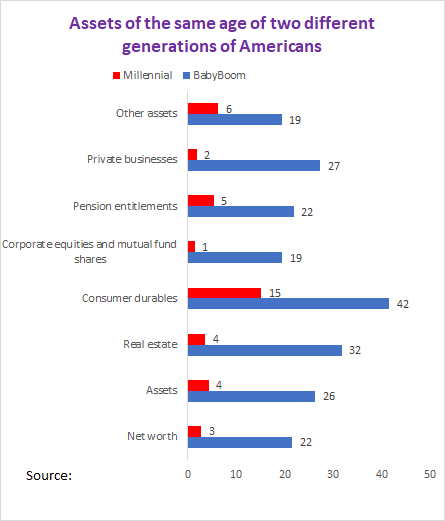

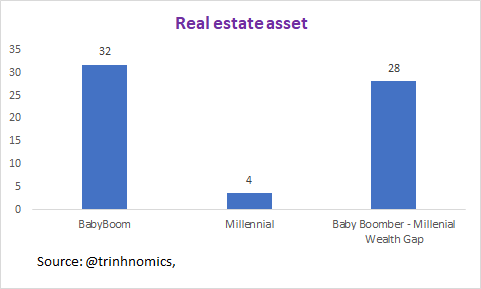 assets in 1989Millennial owned only 4% of real estate https://abs.twimg.com/emoji/v2/... draggable="false" alt="🏠" title="Haus" aria-label="Emoji: Haus">assets in 2019The https://abs.twimg.com/emoji/v2/... draggable="false" alt="🏠" title="Haus" aria-label="Emoji: Haus">gap is 28% https://abs.twimg.com/emoji/v2/... draggable="false" alt="👇🏻" title="Rückhand Zeigefinger nach unten (heller Hautton)" aria-label="Emoji: Rückhand Zeigefinger nach unten (heller Hautton)">https://abs.twimg.com/emoji/v2/... draggable="false" alt="👇🏻" title="Rückhand Zeigefinger nach unten (heller Hautton)" aria-label="Emoji: Rückhand Zeigefinger nach unten (heller Hautton)">https://abs.twimg.com/emoji/v2/... draggable="false" alt="👇🏻" title="Rückhand Zeigefinger nach unten (heller Hautton)" aria-label="Emoji: Rückhand Zeigefinger nach unten (heller Hautton)">" title="Basic human needs: SHELTER. Let& #39;s look at real asset share of ownership of Baby Boomer generation in 1989 vs Millennial in 2019 (same age):Baby Boomer owned 32% of real estate https://abs.twimg.com/emoji/v2/... draggable="false" alt="🏠" title="Haus" aria-label="Emoji: Haus"> assets in 1989Millennial owned only 4% of real estate https://abs.twimg.com/emoji/v2/... draggable="false" alt="🏠" title="Haus" aria-label="Emoji: Haus">assets in 2019The https://abs.twimg.com/emoji/v2/... draggable="false" alt="🏠" title="Haus" aria-label="Emoji: Haus">gap is 28% https://abs.twimg.com/emoji/v2/... draggable="false" alt="👇🏻" title="Rückhand Zeigefinger nach unten (heller Hautton)" aria-label="Emoji: Rückhand Zeigefinger nach unten (heller Hautton)">https://abs.twimg.com/emoji/v2/... draggable="false" alt="👇🏻" title="Rückhand Zeigefinger nach unten (heller Hautton)" aria-label="Emoji: Rückhand Zeigefinger nach unten (heller Hautton)">https://abs.twimg.com/emoji/v2/... draggable="false" alt="👇🏻" title="Rückhand Zeigefinger nach unten (heller Hautton)" aria-label="Emoji: Rückhand Zeigefinger nach unten (heller Hautton)">" class="img-responsive" style="max-width:100%;"/>
assets in 1989Millennial owned only 4% of real estate https://abs.twimg.com/emoji/v2/... draggable="false" alt="🏠" title="Haus" aria-label="Emoji: Haus">assets in 2019The https://abs.twimg.com/emoji/v2/... draggable="false" alt="🏠" title="Haus" aria-label="Emoji: Haus">gap is 28% https://abs.twimg.com/emoji/v2/... draggable="false" alt="👇🏻" title="Rückhand Zeigefinger nach unten (heller Hautton)" aria-label="Emoji: Rückhand Zeigefinger nach unten (heller Hautton)">https://abs.twimg.com/emoji/v2/... draggable="false" alt="👇🏻" title="Rückhand Zeigefinger nach unten (heller Hautton)" aria-label="Emoji: Rückhand Zeigefinger nach unten (heller Hautton)">https://abs.twimg.com/emoji/v2/... draggable="false" alt="👇🏻" title="Rückhand Zeigefinger nach unten (heller Hautton)" aria-label="Emoji: Rückhand Zeigefinger nach unten (heller Hautton)">" title="Basic human needs: SHELTER. Let& #39;s look at real asset share of ownership of Baby Boomer generation in 1989 vs Millennial in 2019 (same age):Baby Boomer owned 32% of real estate https://abs.twimg.com/emoji/v2/... draggable="false" alt="🏠" title="Haus" aria-label="Emoji: Haus"> assets in 1989Millennial owned only 4% of real estate https://abs.twimg.com/emoji/v2/... draggable="false" alt="🏠" title="Haus" aria-label="Emoji: Haus">assets in 2019The https://abs.twimg.com/emoji/v2/... draggable="false" alt="🏠" title="Haus" aria-label="Emoji: Haus">gap is 28% https://abs.twimg.com/emoji/v2/... draggable="false" alt="👇🏻" title="Rückhand Zeigefinger nach unten (heller Hautton)" aria-label="Emoji: Rückhand Zeigefinger nach unten (heller Hautton)">https://abs.twimg.com/emoji/v2/... draggable="false" alt="👇🏻" title="Rückhand Zeigefinger nach unten (heller Hautton)" aria-label="Emoji: Rückhand Zeigefinger nach unten (heller Hautton)">https://abs.twimg.com/emoji/v2/... draggable="false" alt="👇🏻" title="Rückhand Zeigefinger nach unten (heller Hautton)" aria-label="Emoji: Rückhand Zeigefinger nach unten (heller Hautton)">" class="img-responsive" style="max-width:100%;"/>


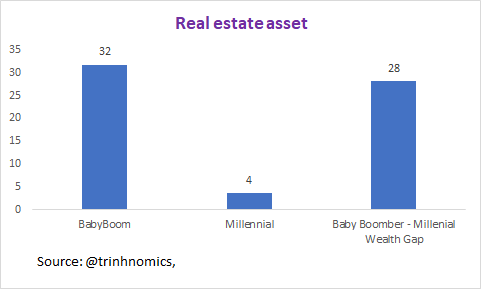
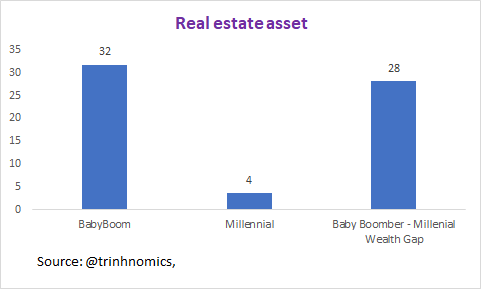 " title="We have a generation of Americans not part of this. Housing wealth is the best way to provide security when old (no more housing costs if paid off & what& #39;s left is property tax + insurance & maintenance) & also a source of security for the next generation.This chart is scaryhttps://abs.twimg.com/emoji/v2/... draggable="false" alt="👇🏻" title="Rückhand Zeigefinger nach unten (heller Hautton)" aria-label="Emoji: Rückhand Zeigefinger nach unten (heller Hautton)">" class="img-responsive" style="max-width:100%;"/>
" title="We have a generation of Americans not part of this. Housing wealth is the best way to provide security when old (no more housing costs if paid off & what& #39;s left is property tax + insurance & maintenance) & also a source of security for the next generation.This chart is scaryhttps://abs.twimg.com/emoji/v2/... draggable="false" alt="👇🏻" title="Rückhand Zeigefinger nach unten (heller Hautton)" aria-label="Emoji: Rückhand Zeigefinger nach unten (heller Hautton)">" class="img-responsive" style="max-width:100%;"/>

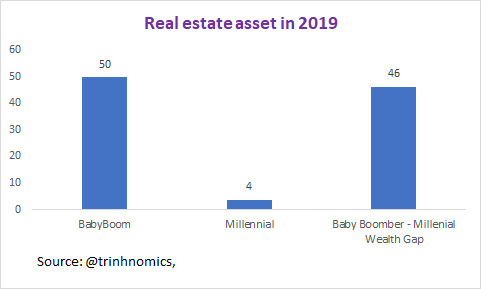
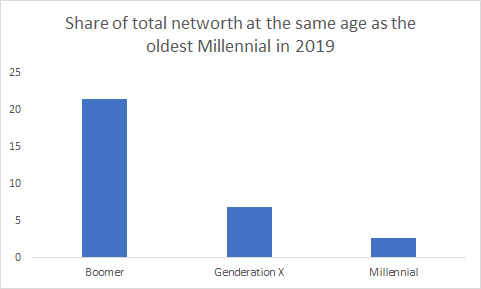
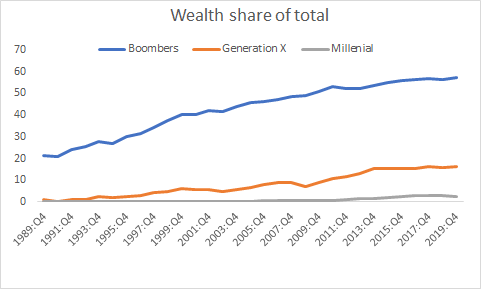
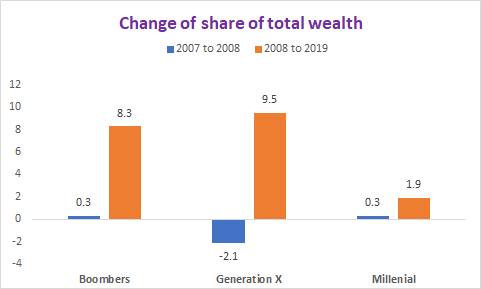
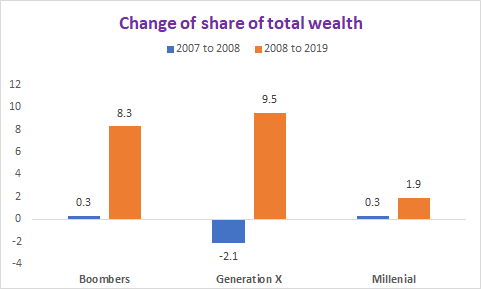
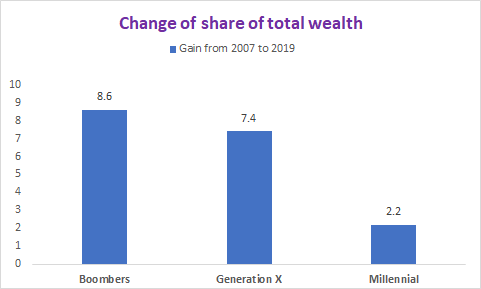 " title="Change of share of total net worth from 2007 to 2019 by groups:Boomers +8.6% of the wealth pieGeneration X +7.4% of total wealth pieMillennial +2.2% to total wealth to reach to total wealth by 2019 of 2.7% of the total net worth pie.We are in the slow train to adulthood.https://abs.twimg.com/emoji/v2/... draggable="false" alt="👇🏻" title="Rückhand Zeigefinger nach unten (heller Hautton)" aria-label="Emoji: Rückhand Zeigefinger nach unten (heller Hautton)">" class="img-responsive" style="max-width:100%;"/>
" title="Change of share of total net worth from 2007 to 2019 by groups:Boomers +8.6% of the wealth pieGeneration X +7.4% of total wealth pieMillennial +2.2% to total wealth to reach to total wealth by 2019 of 2.7% of the total net worth pie.We are in the slow train to adulthood.https://abs.twimg.com/emoji/v2/... draggable="false" alt="👇🏻" title="Rückhand Zeigefinger nach unten (heller Hautton)" aria-label="Emoji: Rückhand Zeigefinger nach unten (heller Hautton)">" class="img-responsive" style="max-width:100%;"/>
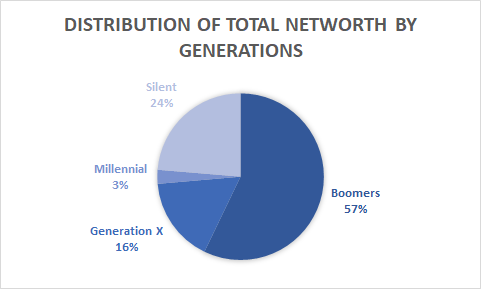
 https://abs.twimg.com/emoji/v2/... draggable="false" alt="🤢" title="Angewidertes Gesicht" aria-label="Emoji: Angewidertes Gesicht">https://abs.twimg.com/emoji/v2/... draggable="false" alt="🤢" title="Angewidertes Gesicht" aria-label="Emoji: Angewidertes Gesicht">and the bad news isb) We have even less home mortgages. Now only 9.9% of total & that& #39;s a decline from 12.1% in 2015.https://abs.twimg.com/emoji/v2/... draggable="false" alt="😬" title="Grimasse schneidendes Gesicht" aria-label="Emoji: Grimasse schneidendes Gesicht">" title="Urghhh, this is bad news. Let& #39;s look at our choice of private debt:a) We have 33.1% of total consumer credit, and that is higher from 1.2% in 2008 https://abs.twimg.com/emoji/v2/... draggable="false" alt="🤢" title="Angewidertes Gesicht" aria-label="Emoji: Angewidertes Gesicht">https://abs.twimg.com/emoji/v2/... draggable="false" alt="🤢" title="Angewidertes Gesicht" aria-label="Emoji: Angewidertes Gesicht">https://abs.twimg.com/emoji/v2/... draggable="false" alt="🤢" title="Angewidertes Gesicht" aria-label="Emoji: Angewidertes Gesicht">and the bad news isb) We have even less home mortgages. Now only 9.9% of total & that& #39;s a decline from 12.1% in 2015.https://abs.twimg.com/emoji/v2/... draggable="false" alt="😬" title="Grimasse schneidendes Gesicht" aria-label="Emoji: Grimasse schneidendes Gesicht">" class="img-responsive" style="max-width:100%;"/>
https://abs.twimg.com/emoji/v2/... draggable="false" alt="🤢" title="Angewidertes Gesicht" aria-label="Emoji: Angewidertes Gesicht">https://abs.twimg.com/emoji/v2/... draggable="false" alt="🤢" title="Angewidertes Gesicht" aria-label="Emoji: Angewidertes Gesicht">and the bad news isb) We have even less home mortgages. Now only 9.9% of total & that& #39;s a decline from 12.1% in 2015.https://abs.twimg.com/emoji/v2/... draggable="false" alt="😬" title="Grimasse schneidendes Gesicht" aria-label="Emoji: Grimasse schneidendes Gesicht">" title="Urghhh, this is bad news. Let& #39;s look at our choice of private debt:a) We have 33.1% of total consumer credit, and that is higher from 1.2% in 2008 https://abs.twimg.com/emoji/v2/... draggable="false" alt="🤢" title="Angewidertes Gesicht" aria-label="Emoji: Angewidertes Gesicht">https://abs.twimg.com/emoji/v2/... draggable="false" alt="🤢" title="Angewidertes Gesicht" aria-label="Emoji: Angewidertes Gesicht">https://abs.twimg.com/emoji/v2/... draggable="false" alt="🤢" title="Angewidertes Gesicht" aria-label="Emoji: Angewidertes Gesicht">and the bad news isb) We have even less home mortgages. Now only 9.9% of total & that& #39;s a decline from 12.1% in 2015.https://abs.twimg.com/emoji/v2/... draggable="false" alt="😬" title="Grimasse schneidendes Gesicht" aria-label="Emoji: Grimasse schneidendes Gesicht">" class="img-responsive" style="max-width:100%;"/>
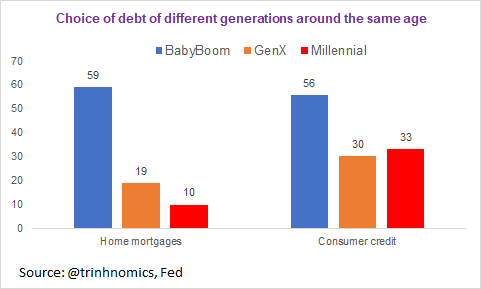
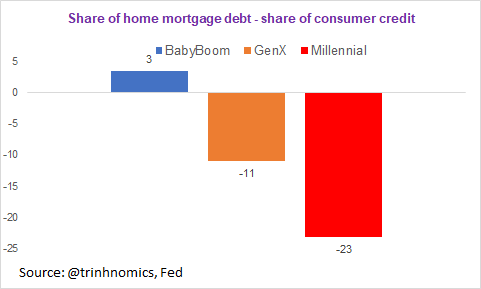
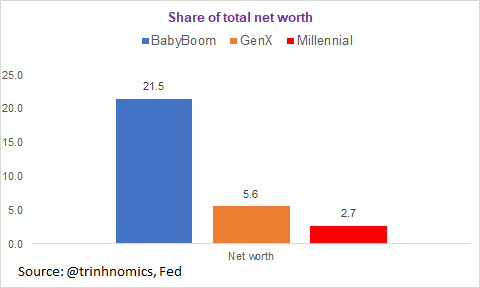
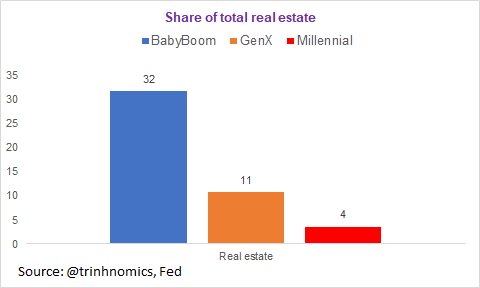
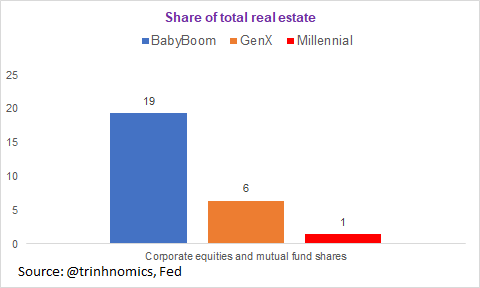
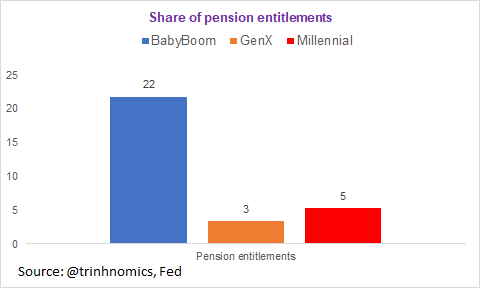

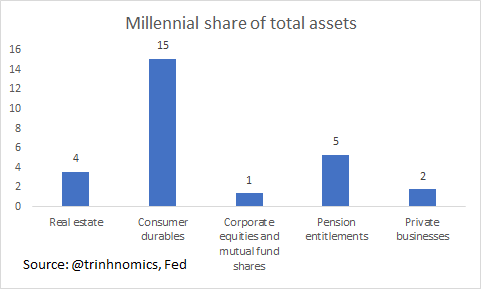 Sincerely, @Trinhnomics (A millennial from CA in HKhttps://abs.twimg.com/emoji/v2/... draggable="false" alt="🤗" title="Umarmendes Gesicht" aria-label="Emoji: Umarmendes Gesicht">)" title="Here is a summary of what we OWN & sadly we don& #39;t own much hard assets & financial assets.The question that& #39;ll be addressed at the next session will be:*How did we get here?*What can we do about it!See you next time!https://abs.twimg.com/emoji/v2/... draggable="false" alt="👋🏻" title="Waving hand (heller Hautton)" aria-label="Emoji: Waving hand (heller Hautton)">Sincerely, @Trinhnomics (A millennial from CA in HKhttps://abs.twimg.com/emoji/v2/... draggable="false" alt="🤗" title="Umarmendes Gesicht" aria-label="Emoji: Umarmendes Gesicht">)" class="img-responsive" style="max-width:100%;"/>
Sincerely, @Trinhnomics (A millennial from CA in HKhttps://abs.twimg.com/emoji/v2/... draggable="false" alt="🤗" title="Umarmendes Gesicht" aria-label="Emoji: Umarmendes Gesicht">)" title="Here is a summary of what we OWN & sadly we don& #39;t own much hard assets & financial assets.The question that& #39;ll be addressed at the next session will be:*How did we get here?*What can we do about it!See you next time!https://abs.twimg.com/emoji/v2/... draggable="false" alt="👋🏻" title="Waving hand (heller Hautton)" aria-label="Emoji: Waving hand (heller Hautton)">Sincerely, @Trinhnomics (A millennial from CA in HKhttps://abs.twimg.com/emoji/v2/... draggable="false" alt="🤗" title="Umarmendes Gesicht" aria-label="Emoji: Umarmendes Gesicht">)" class="img-responsive" style="max-width:100%;"/>
 https://abs.twimg.com/emoji/v2/... draggable="false" alt="😬" title="Grimasse schneidendes Gesicht" aria-label="Emoji: Grimasse schneidendes Gesicht">!" title="It& #39;s lunch time again & will dedicate lunch to u to talk more about this as 1.1M saw this on Twitter & 0.14M engaged w/ it.We all agree that we& #39;re concerned about our present & future. As we own:1% financial assets2% private biz4% real estateyet 33% of consumer debthttps://abs.twimg.com/emoji/v2/... draggable="false" alt="👈🏻" title="Rückhand Zeigefinger nach links (heller Hautton)" aria-label="Emoji: Rückhand Zeigefinger nach links (heller Hautton)">https://abs.twimg.com/emoji/v2/... draggable="false" alt="😬" title="Grimasse schneidendes Gesicht" aria-label="Emoji: Grimasse schneidendes Gesicht">!" class="img-responsive" style="max-width:100%;"/>
https://abs.twimg.com/emoji/v2/... draggable="false" alt="😬" title="Grimasse schneidendes Gesicht" aria-label="Emoji: Grimasse schneidendes Gesicht">!" title="It& #39;s lunch time again & will dedicate lunch to u to talk more about this as 1.1M saw this on Twitter & 0.14M engaged w/ it.We all agree that we& #39;re concerned about our present & future. As we own:1% financial assets2% private biz4% real estateyet 33% of consumer debthttps://abs.twimg.com/emoji/v2/... draggable="false" alt="👈🏻" title="Rückhand Zeigefinger nach links (heller Hautton)" aria-label="Emoji: Rückhand Zeigefinger nach links (heller Hautton)">https://abs.twimg.com/emoji/v2/... draggable="false" alt="😬" title="Grimasse schneidendes Gesicht" aria-label="Emoji: Grimasse schneidendes Gesicht">!" class="img-responsive" style="max-width:100%;"/>

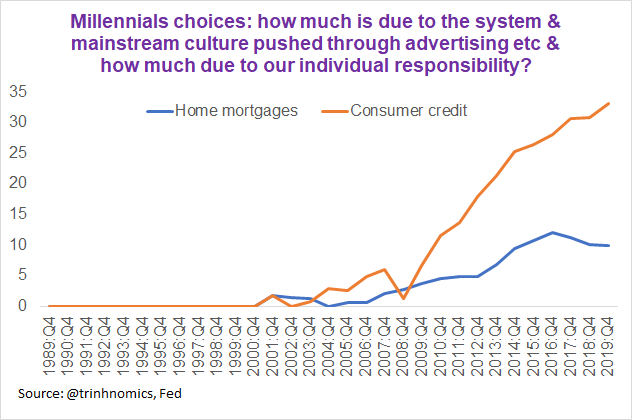
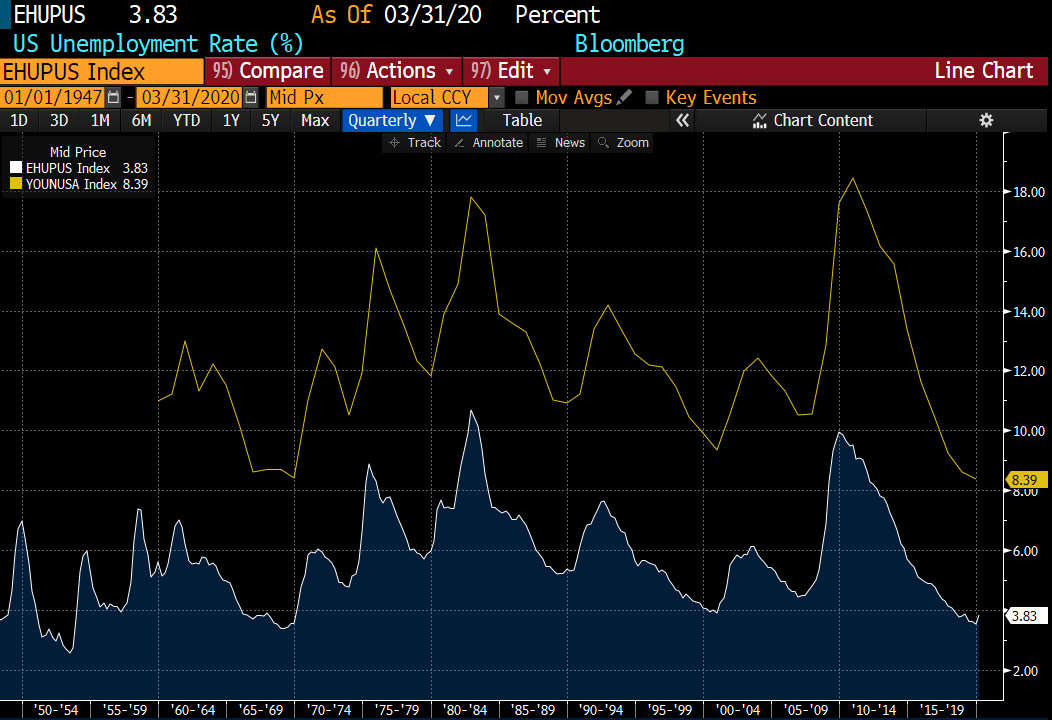 ." title="In 2009, the oldest millennial would be 28 years old. And those born in the mid 1980s would be 24 years old in 2009.Let& #39;s talk about the 24-28 years old Americans. What do they find when they emerged from undergraduate/grad school? The aftermath of the GFC. US unemploymenthttps://abs.twimg.com/emoji/v2/... draggable="false" alt="👇🏻" title="Rückhand Zeigefinger nach unten (heller Hautton)" aria-label="Emoji: Rückhand Zeigefinger nach unten (heller Hautton)">." class="img-responsive" style="max-width:100%;"/>
." title="In 2009, the oldest millennial would be 28 years old. And those born in the mid 1980s would be 24 years old in 2009.Let& #39;s talk about the 24-28 years old Americans. What do they find when they emerged from undergraduate/grad school? The aftermath of the GFC. US unemploymenthttps://abs.twimg.com/emoji/v2/... draggable="false" alt="👇🏻" title="Rückhand Zeigefinger nach unten (heller Hautton)" aria-label="Emoji: Rückhand Zeigefinger nach unten (heller Hautton)">." class="img-responsive" style="max-width:100%;"/>
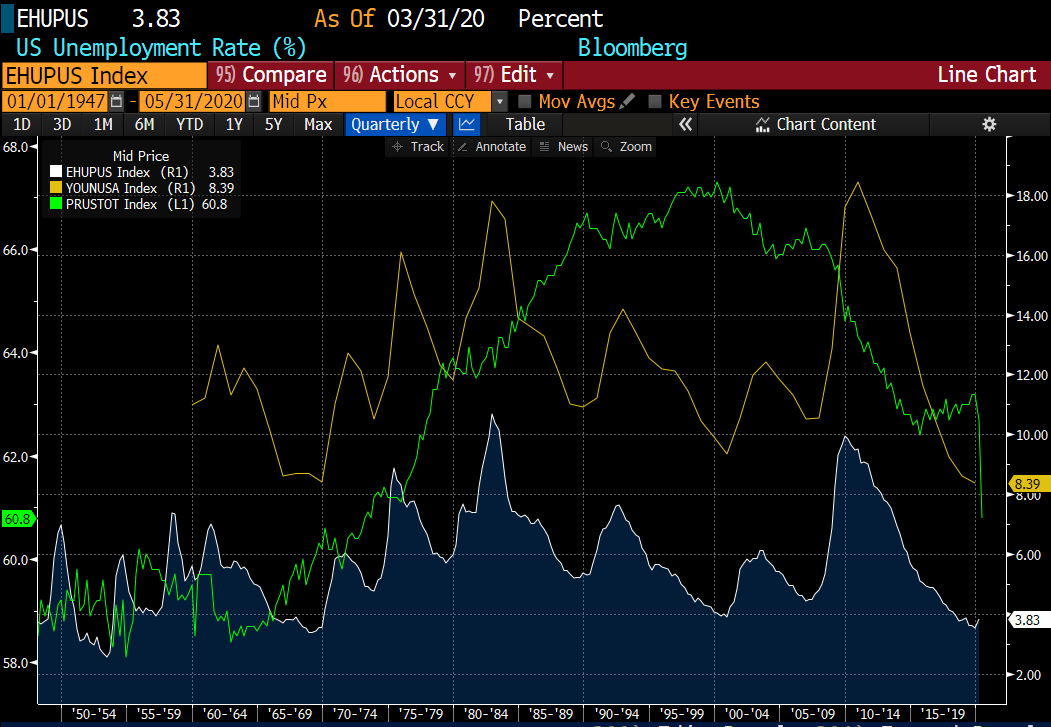


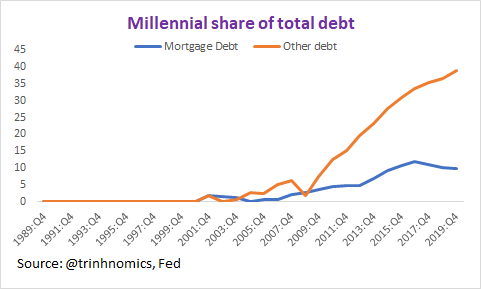
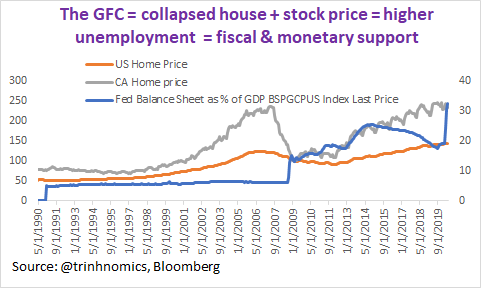
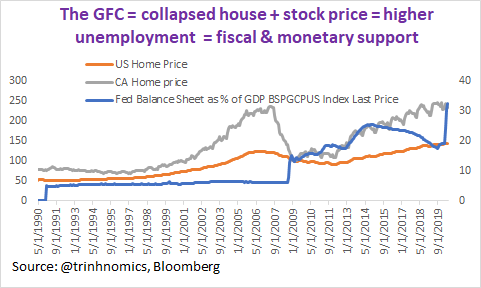

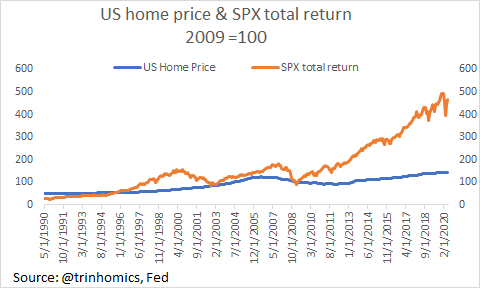
 " title="Change of wealth from 2007-2019: Share is more positive for all three generations but the gain for Millennial is much less for the fact that they did not own enough (& still don& #39;t):Financial AssetReal Estate Asset Change of net worth & evolution of millennial asset sharehttps://abs.twimg.com/emoji/v2/... draggable="false" alt="👇🏻" title="Rückhand Zeigefinger nach unten (heller Hautton)" aria-label="Emoji: Rückhand Zeigefinger nach unten (heller Hautton)">">
" title="Change of wealth from 2007-2019: Share is more positive for all three generations but the gain for Millennial is much less for the fact that they did not own enough (& still don& #39;t):Financial AssetReal Estate Asset Change of net worth & evolution of millennial asset sharehttps://abs.twimg.com/emoji/v2/... draggable="false" alt="👇🏻" title="Rückhand Zeigefinger nach unten (heller Hautton)" aria-label="Emoji: Rückhand Zeigefinger nach unten (heller Hautton)">">
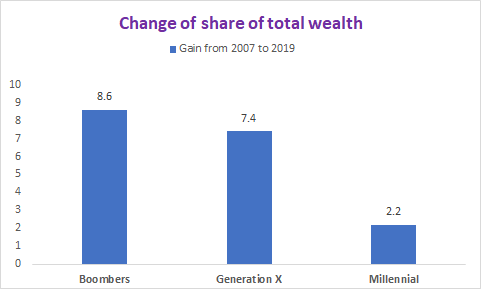 " title="Change of wealth from 2007-2019: Share is more positive for all three generations but the gain for Millennial is much less for the fact that they did not own enough (& still don& #39;t):Financial AssetReal Estate Asset Change of net worth & evolution of millennial asset sharehttps://abs.twimg.com/emoji/v2/... draggable="false" alt="👇🏻" title="Rückhand Zeigefinger nach unten (heller Hautton)" aria-label="Emoji: Rückhand Zeigefinger nach unten (heller Hautton)">">
" title="Change of wealth from 2007-2019: Share is more positive for all three generations but the gain for Millennial is much less for the fact that they did not own enough (& still don& #39;t):Financial AssetReal Estate Asset Change of net worth & evolution of millennial asset sharehttps://abs.twimg.com/emoji/v2/... draggable="false" alt="👇🏻" title="Rückhand Zeigefinger nach unten (heller Hautton)" aria-label="Emoji: Rückhand Zeigefinger nach unten (heller Hautton)">">
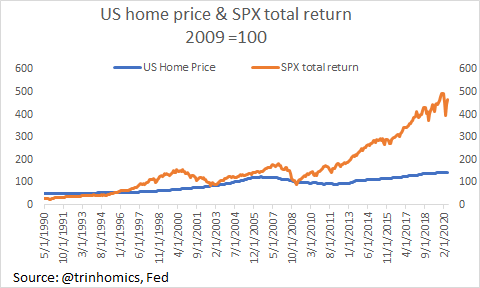



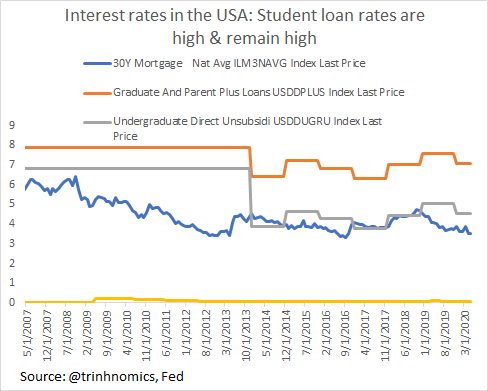
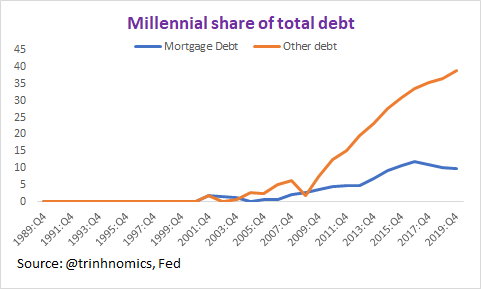

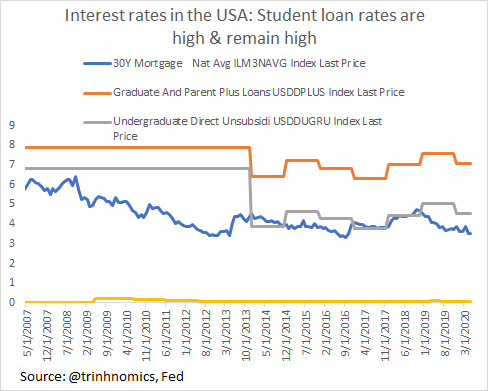

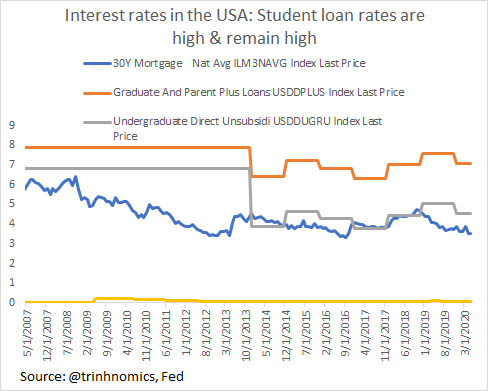 ." title="We must change this culture of young people taking out debt such as consumer credit card, auto loan debt, & STUDENT LOAN DEBT without understanding compound interests & how that will eat into their future prospect. Okay, let& #39;s talk about assets now that we talked about debt https://abs.twimg.com/emoji/v2/... draggable="false" alt="🤗" title="Umarmendes Gesicht" aria-label="Emoji: Umarmendes Gesicht">." class="img-responsive" style="max-width:100%;"/>
." title="We must change this culture of young people taking out debt such as consumer credit card, auto loan debt, & STUDENT LOAN DEBT without understanding compound interests & how that will eat into their future prospect. Okay, let& #39;s talk about assets now that we talked about debt https://abs.twimg.com/emoji/v2/... draggable="false" alt="🤗" title="Umarmendes Gesicht" aria-label="Emoji: Umarmendes Gesicht">." class="img-responsive" style="max-width:100%;"/>


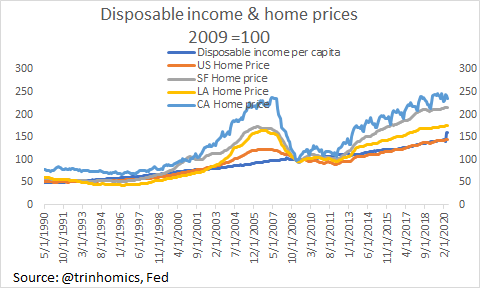

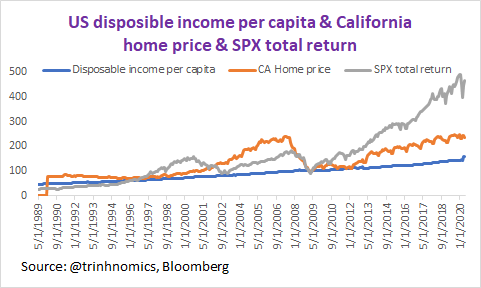 " title="If u worked hard, and assuming u made great decisions in paying off your student loan debt ASAP & do not have any consumer credit debt & put your disposable income into savings through just bank deposits then u are not compounding at all.CA home price & SPX return skyrockets!https://abs.twimg.com/emoji/v2/... draggable="false" alt="🚀" title="Rakete" aria-label="Emoji: Rakete">" class="img-responsive" style="max-width:100%;"/>
" title="If u worked hard, and assuming u made great decisions in paying off your student loan debt ASAP & do not have any consumer credit debt & put your disposable income into savings through just bank deposits then u are not compounding at all.CA home price & SPX return skyrockets!https://abs.twimg.com/emoji/v2/... draggable="false" alt="🚀" title="Rakete" aria-label="Emoji: Rakete">" class="img-responsive" style="max-width:100%;"/>
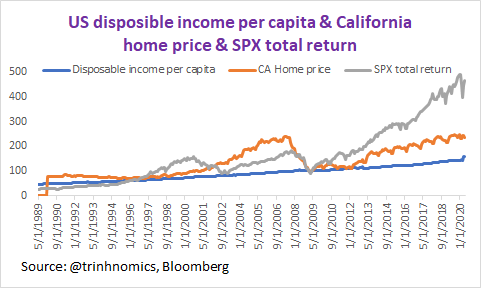
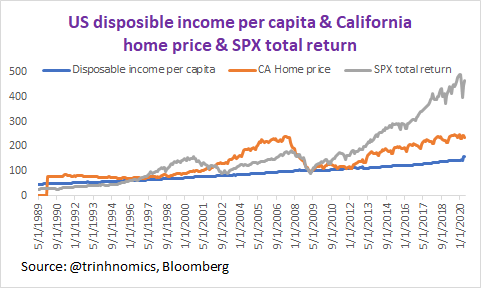
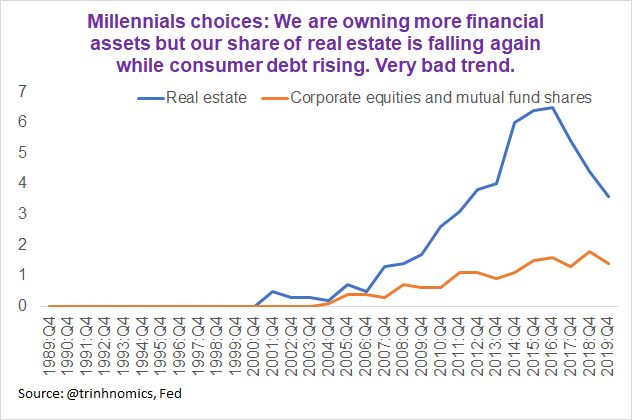 " title="Juxtaposition of millennial ownership of financial assets & real estate asset, which is 1.4% for financial & only 3.6% for real estate, and, wait for it:SPX total return & CA housing prices. We have a lot of bad debt & not enough of the stuff that is skyrocketing in return.https://abs.twimg.com/emoji/v2/... draggable="false" alt="👈🏻" title="Rückhand Zeigefinger nach links (heller Hautton)" aria-label="Emoji: Rückhand Zeigefinger nach links (heller Hautton)">" class="img-responsive" style="max-width:100%;"/>
" title="Juxtaposition of millennial ownership of financial assets & real estate asset, which is 1.4% for financial & only 3.6% for real estate, and, wait for it:SPX total return & CA housing prices. We have a lot of bad debt & not enough of the stuff that is skyrocketing in return.https://abs.twimg.com/emoji/v2/... draggable="false" alt="👈🏻" title="Rückhand Zeigefinger nach links (heller Hautton)" aria-label="Emoji: Rückhand Zeigefinger nach links (heller Hautton)">" class="img-responsive" style="max-width:100%;"/>


